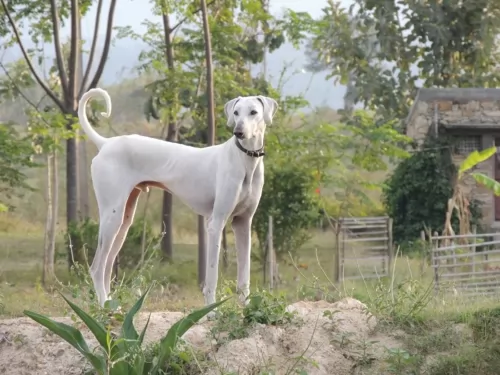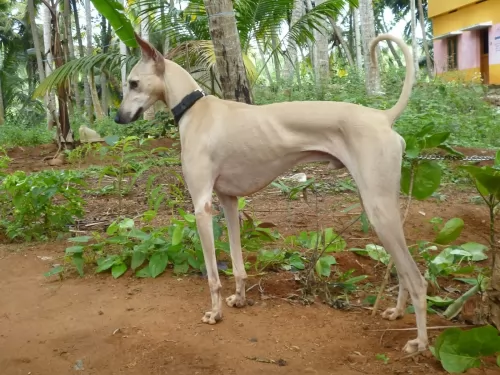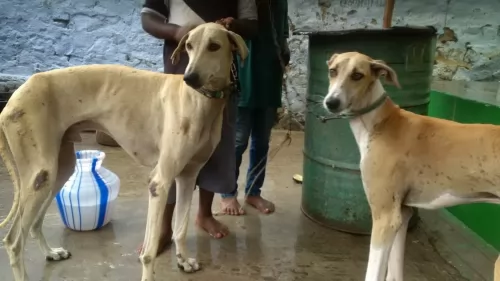 Petzlover
PetzloverChippiparai is originated from India but Russian Setter is originated from Russia. Both Chippiparai and Russian Setter are having almost same height. Chippiparai may weigh 12 kg / 26 pounds lesser than Russian Setter. Both Chippiparai and Russian Setter has almost same life span. Both Chippiparai and Russian Setter has almost same litter size. Chippiparai requires Low Maintenance. But Russian Setter requires Moderate Maintenance
 The Chippiparai is a working dog found in India and until recently there has been little interest in the purity of any breed, but rather only an emphasis on the abilities of the dog. They are only beginning to research the origin and history of their native dogs such as the Chippiparai. Not much is known about the origin of the breed except that it is found almost exclusively in Tamil Nadu and Keraia in the southern part of the subcontinent of India. Other than this there is much speculation about the breed’s origin but very little-known facts. It is indeed an ancient breed; however, its origin could be thousands of years ago or simply hundreds of years ago.
The Chippiparai is a working dog found in India and until recently there has been little interest in the purity of any breed, but rather only an emphasis on the abilities of the dog. They are only beginning to research the origin and history of their native dogs such as the Chippiparai. Not much is known about the origin of the breed except that it is found almost exclusively in Tamil Nadu and Keraia in the southern part of the subcontinent of India. Other than this there is much speculation about the breed’s origin but very little-known facts. It is indeed an ancient breed; however, its origin could be thousands of years ago or simply hundreds of years ago.
• Perhaps it is a descendant of the Saluki as it resembles this breed quite a bit. It has been believed for some time that the Saluki is the original sighthound and the source of all sighthound breeds. The Saluki was very popular in the Middle East, especially in Persia and Arabia from which it could easily have spread to India. It would then have been shared from Northern India to Southern India where the Chippiparai is found.
• Perhaps the Chippiparai is a descendent of sighthounds from Central Asia and Afghanistan – the Tazi, Taigan, Hortaya Borsaya or the Afghan Hound. This part of Central Asia had more trade, influence and contact with the Indian subcontinent early in their history than with any other region. The Chippiparai is considered by some to be more like these sighthounds than like the Saluki and the interaction between these regions has a much longer history than the Middle East and India.
• It is also speculated that the Chippiparai might have been developed completely and uniquely from the local street and working dogs. With the civilization of India being one of the oldest in the world, it is considered a possibility that the Chippiparai is the descendent of the Harappan hunting dogs that probably were developed by the Indus Valley or Harappa roiling class.
Wherever the Chippiparai came from, they were the exclusive property of the wealthy and ruling castes. These upper castes were the only ones that could legally hunt with dogs or afford to feed one. The royal classes of Tiruneivell, Thanjavur, and Madurai all fed the popularity of the breed among the upper castes. They were coursing dogs used to chase down the prey once it was sighted. The Chippiparai are incredibly fast runners and would catch almost any prey and either hold it or kill it for their hunter. The Chippiparai, when not hunting, had to be chained so they would not chase any small animal that they saw. This confinement also added to the purity of the breed as random breeding was prevented.
The southern part of the Indian subcontinent is extremely hot with routine temperatures over 100’. The Chippiparai was developed to withstand these extreme temperatures and is more heat tolerant than most any other breed. They also need very little food and are resistant to the many parasites and diseases found in southern India.
Harboring the belief that Indian dogs were not as good as European ones, the occupying countries of Portugal, France, and Britain, had no interest in the Chippiparai, again leaving the breed to develop naturally on their own with little or no interbreeding. They also received no formal recognition because Indian culture only valued the dog for its working abilities. There was no Indian Kennel Club until 1956.
The Chippiparai is now very rarely and only found in the area of its birth. Many believe the breed is in danger of becoming extinct and even though it is now registered with Indian Kennel Clubs it is not often shown in their dog shows. Lovers of the breed are now attempting to get Indians to recognize that the Chippiparai is a great companion animal and attempting to save the breed.
People often think it is ridiculous that a Setter dog comes from Russia. It is believed that the Russians did have some kind of Griffon and the word Pointer is also often translated as Setter.
It is believed that the Russian Setter is one of the ancestors of the Wire-haired Pointing Griffon and that it possibly shared an ancestry with the German wire-haired and broken-haired pointers.
References to Russian Setters were fairly common in the 19th century, but there is such contradictory information that it is hard to get good information on the dogs. The Russian Setter is believed to have existed before the Russian Revolution resembling the English Setter. Dog experts tell us the dog no longer exists.
 The Chippiparai is a typical sighthound although their size and appearance will vary more than that of registered purebred sighthounds. Typically, they will have a long, domed head with small erect ears and dark eyes. Their muzzle will be as deep and wide as the skull but longer. Their legs are straight and long, their chest is roached back and deep, giving them, an appearance very similar to a greyhound or other sighthound.
The Chippiparai is a typical sighthound although their size and appearance will vary more than that of registered purebred sighthounds. Typically, they will have a long, domed head with small erect ears and dark eyes. Their muzzle will be as deep and wide as the skull but longer. Their legs are straight and long, their chest is roached back and deep, giving them, an appearance very similar to a greyhound or other sighthound.
They have a long curly tail, and their coat can vary greatly in color. They are medium sized, and their coat is short, shiny and close. He is very slender and sleek, which along with his long legs gives him that incredible speed. They are thin with visible ribs.
In terms of appearance, it was John Henry Walsh who said that the Russian Setter was a dog hidden by its long, woolly matted coat.It seems to have been a medium sized dog with an elegant appearance. It seems the dog came in two varieties - the curly coated liver coated dogs and the fawn colored dogs which are straight coated.
Because there is very little information on these dogs, we assume they were between 57 – 68cm in height and between 27 and 32kg in weight. The coat was no doubt in colours such as grey, reddish-brown with some black and white and shortish and wiry. The ears were floppy,and the face no doubt had some longer hair around the muzzle.
Nobody seems to know exactly what the temperament of this dog was, but when you look at some of his ancestors you can assume that he was strong-willed, confident and a skilled hunter.
He would have required a lot of exercise too. He was lively and energetic. Because he had Pointer in him you can be sure that he would have been intelligent so that he could be trained and socialized.
He would have been keen to learn with an owner who was firm and consistent in his treatment of him. He is a dog most happiest when he can spend time with his human family, a most loyal and devoted family friend, capable of getting on well with children and pets in the home.
 The Chippiparai is a loving, gentle family dog if well socialized, well trained and well exercised. They are very intelligent and need human companionship. Once they are living with a human family, they are very protective of that family. They are for the most part peaceful and quiet dogs. They are loyal and loving but they are not overly affectionate. Cuddlers they are not, and they do not like to play rough with children.
The Chippiparai is a loving, gentle family dog if well socialized, well trained and well exercised. They are very intelligent and need human companionship. Once they are living with a human family, they are very protective of that family. They are for the most part peaceful and quiet dogs. They are loyal and loving but they are not overly affectionate. Cuddlers they are not, and they do not like to play rough with children.
Accepting and loving within the family, the Chippiparai are equally hesitant and shy around strangers. They can be suspicious, but they are not aggressive. They are just very aloof with strangers, yet they hardly ever bark.
It appears, according to records that the Russian Setter has come and gone. However he would have been a calm, gentle pet with running ad hunting keeping him happy. He would therefore have required a lot of exercise.
We can assume that according to the few records that there are, that this was an affable, pleasing dog breed which made a great family pet.
 There are no clinical studies regarding the health and health history of the Chippiparai, so little is known about their long-term health. However, most who know the breed, believe it is an incredibly healthy one. They seem to have a lot less genetically transmitted health issues than other purebreds. Because of their isolation for centuries in India, they have developed immunities and resistance to most parasites and diseases other dog suffer from.
There are no clinical studies regarding the health and health history of the Chippiparai, so little is known about their long-term health. However, most who know the breed, believe it is an incredibly healthy one. They seem to have a lot less genetically transmitted health issues than other purebreds. Because of their isolation for centuries in India, they have developed immunities and resistance to most parasites and diseases other dog suffer from.
Because of this you should look for the types of issues that occur in dogs of this size and build. Have them tested by the Canine Eye Registration Foundation and the Orthopedic Foundation for Animals.
The Russian Setter had an average lifespan of 10 – 14 which is a fairly good innings for a dog. Nonetheless you would have had to be aware of some common dog problem. These dogs were prone to major health issues such as both hip and elbow dysplasia, deafness, epilepsy and hypothyroidism.
The thyroid glands produce hormones that affect the function of many parts of the body. Dogs with this illness have a low production of thyroid hormones.
This disease is mainly caused by inflammation or shrinkage of the thyroid gland. The most common signs of low thyroid in dogs is thinning of the fur, the coat is dull, there is weight gain and excess shedding. The dog doesn’t tolerate cold well either. These dogs also often have ear infections.
 Do not overfeed your Chippiparai. Feed twice a day and no more than a total of 2.5 cups of high quality dry food.
Do not overfeed your Chippiparai. Feed twice a day and no more than a total of 2.5 cups of high quality dry food.
As mentioned previously the Chippiparai seems to have no genetic diseases or issues and very few acquired ones. However, he is sensitive to anesthesia and some foods. He is intolerant to cold weather and has a hard time with his pads on hard surfaces. Some Chippiparai might experience some of the ailments other breeds like them experience.
Both Elbow and hip are possible. This can cause arthritis and lameness. This occurs when the bone does not fit well into the joint.
This can cause lameness as well. The kneecaps slide over the knee instead of staying in place.
This is a hunting dog and he will want to hunt. They are incredibly fast and need the opportunity to run. Brisk walks will not be enough for this dog. He is very energetic. They will chase any small animals. It is not recommended that you have small pets even small dogs or cats with a Chippiparai. Having been bred for centuries to hunt, they are not likely to respond to any commands if they are off lease and chasing prey. Do not allow them to be off leash unless in a fenced area, and that fence needs to be 8 feet tall as they can easily jump a seven-foot fence. Try they at coursing, agility, fly ball and frisbee competitions.
Whatever kind of coat the Russian Setter ad it would have required a brushing twice a week to keep it in top form.
The medium length floppy ears would have to be checked inside for ear infection.
His owners would have checked inside the mouth for any signs of rotten or bad teeth.
His nails would have required trimming.
Dogs need the best food there is to stay healthy. The Russian Terrier, if it were still around today, would have had the best commercially manufactured food there was.
You want to provide dogs with some good homemade food too. Dogs thrive on simplicity and consistency to avoid upsetting the stomach. Some home-cooked food such as boiled chicken, sweet potatoes, brown rice or pasta, carrots and spinach would be perfect for him. Chop the food up finely and add it into the dry kibble once or twice a week. Raw meat should also be added in when possible to promote good skin health.
Make sure your pet is never without a constant supply of fresh, cool water.